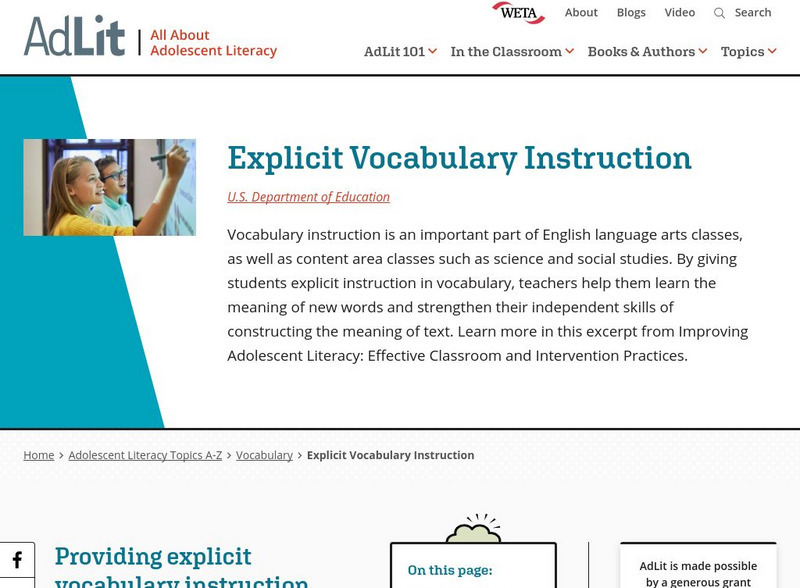AdLit
Ad lit.org: 5 Homework Strategies for Teaching Students With Learning Disabilities
Many students with learning or reading disabilities find homework challenging. Here are five research-based strategies that teachers can use to help students.
AdLit
Ad lit.org: Hooking Struggling Readers: Using Books They Can and Want to Read
One of the keys to helping struggling readers is to provide them with books that they can and want to read. Fiction for struggling readers must have realistic characters, readable and convincing text, and a sense of the readers'...
AdLit
Ad lit.org: Making Writing Instruction a Priority in Middle and High Schools
Sometimes writing is seen as the flip side of reading, and it is assumed that students who are proficient readers will naturally be proficient writers. While reading and writing are complementary skills, students do not become skilled...
AdLit
Ad lit.org: Developing a Positive School Climate
What is meant by "school climate", and how can you assess the climate at your school? Read on for helpful definitions, assessment ideas, tools, and resources.
AdLit
Ad lit.org: Five Phases of Professional Development
Too often, teachers say that the professional development they receive provides limited application to their everyday world of teaching and learning. Here The North Central Regional Educational Laboratory shares a five-phase framework...
AdLit
Ad lit.org: Making College and Career Readiness the Mission for High Schools
To close the gap between what is expected of a high school graduate and what the world beyond high school demands, state leaders will need to develop coherent policies that equate earning a high school diploma with being prepared for the...
AdLit
Ad lit.org: Helping Equip Teachers to Answer Questions on College Knowledge
In a Stanford University study, a majority of high school students reported speaking with a teacher at least once about college admissions requirements, but teachers reported receiving very little information to answer their students'...
AdLit
Ad lit.org: Explicit Vocabulary Instruction
Vocabulary instruction is an important part of reading and language arts classes, as well as content-area classes such as science and social studies. By giving students explicit instruction in vocabulary, teachers help them learn the...
AdLit
Ad lit.org: Developing Academic Language: Got Words?
Concerns about how to build academic vocabulary and weave its instruction into curricula are common among classroom teachers. This article reviews the research and offers some practical suggestions for teachers.
AdLit
Ad lit.org: Giving Feedback on Student Writing
Learn how to conduct effective peer and teacher writing conferences to improve student writing.
AdLit
Ad lit.org: Content Area Literacy: Literature
Reading complex literary texts offers unique opportunities for students to wrestle with some of the core ethical dilemmas that we face as human beings. The growth of ethical reasoning is one of the most compelling reasons for schools to...
AdLit
Ad lit.org: Classroom Strategies: Seed Discussion
A Seed Discussion is a two-part strategy used to teach students how to engage in discussions about assigned readings. In the first part, students read selected text and identify "seeds" or key concepts of a passage which may need...
Other
All4ed.org: Urgent but Overlooked: Literacy Crisis Among Adolescent El Ls
English language learners (ELLs) represent more than 10% of the national pre-K through 12th grade enrollment, and more than 70% of these ELLs fail to develop strong literacy skills. To increase this group's educational, college, and job...
AdLit
Ad lit.org: Collaborative Conferences
In this video two teachers collaborate to support one another through observation and feedback. This clip is excerpted from Stenhouse Publishers' "Collaborative Conferences."













